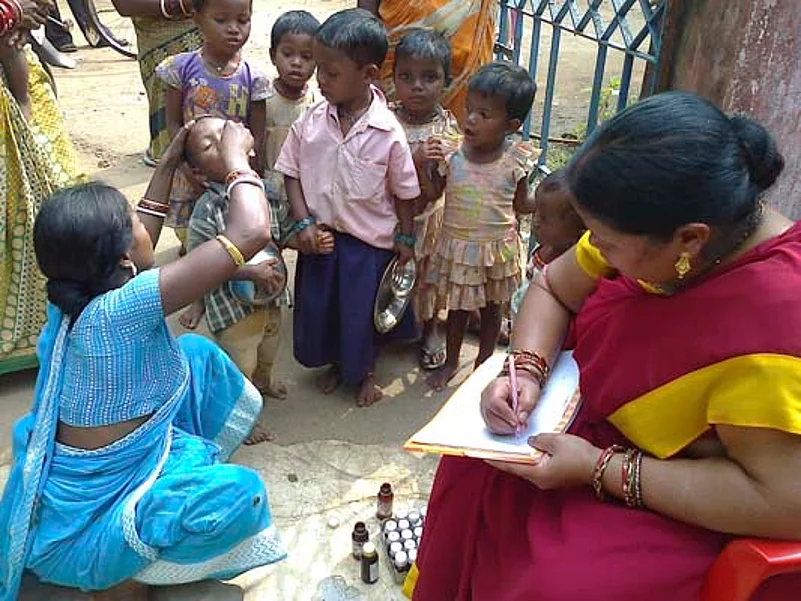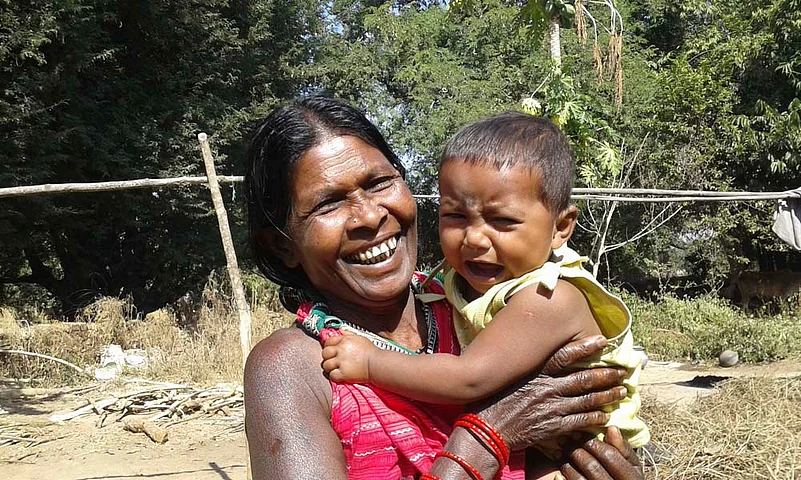India needs to fight on all fronts for a Nutrition Revolution to succeed – through focus on the first 1,000 days of the child (from the womb to the first two years), combating rampant anaemia among women and children, focus on bio-fortification of crops, and most importantly setting up a separate Ministry of Food Security and Nutrition.
Focus on First 1,000 Days and Adolescent Girls
Right nutrition during the first 1,000-day window has a profound impact on a child’s ability to grow, learn and thrive. The National Food Security Act (NFSA), 2013 has a clear mandate for ‘Food and Nutrition Security in a Life Cycle Approach’. The Act prescribes key food and nutrition entitlements like Targeted Public Distribution System (TPDS), Integrated Child Development Service (ICDS) and Mid-Day Meal (MDM) programmes in the states.
Advertisement
A two-pronged strategy focusing on both prevention and management needs to be adopted. It is necessary to prevent acute malnutrition (both Moderate Acute Malnutrition and Severe Acute Malnutrition), thus subsequently reducing the rates of stunting. Using a life-cycle approach with focus on the first 1,000 days, gender, equity and diversity, nutrition for adolescent girls who are future mothers – are critical to address malnutrition of the future child. Nutrition during pregnancy and in the first years of a child’s life provides the essential building blocks for brain development, healthy growth and a strong immune system. It is necessary to reach out to the most marginalized population, including the tribal, minorities – SC and ST and particularly vulnerable tribal groups (PVTG).
Advertisement

Strategy to Address Anaemia, Lymphatic Filariasis, Malaria, Childhood TB and HIV
In India, anaemia is all-pervasive. In a number of states anaemia increased over a 10-year period, which is an alarming sign. It is seen that at the policy level there is an over emphasis on iron supplementation and fortification to address anaemia. Research studies suggest that infection/inflammation, iron deficiency, micronutrient deficiencies such as Vitamins A, B6, B12, C, riboflavin, folate, copper and some of the genetic factors like sickle cell anaemia contribute to overall anaemia prevalence.
There is a need to address all forms of anaemia, including sickle cell anaemia, with a special emphasis on research, innovation and state of the art technologies. There needs to be an inter-connection strategy between nutrition, filarial and malarial reduction and childhood TB and HIV. In the endemic areas, screening of filaria, malaria can be incorporated specifically in routine antenatal care, village health nutrition and sanitation day (VHNSD) and Gram Sabhas. In the endemic areas, specific screening needs to be done for all children under five for malnutrition and malaria.
Setting up New Institutional Arrangements and Capacity Building
The leaders will shape the agenda, transform the landscape and lead the Nutrition Revolution. The dedicated and adequately empowered and resourced leadership with women at the forefront, backed by robust institutional arrangements and enhanced capacities of the functionaries, will be an important agenda for success.
Like India’s Green and White revolutions, which received strong patronage and the highest political will to deliver and transform, a Nutrition Revolution needs a very well-structured institutional mechanism.
There has to be an independent Ministry of Food Security and Nutrition with strong convergence plan with allied ministries. An Institution of National Importance on Nutrition can be established under an Act of Parliament to steer this revolution with women at the forefront.
Advertisement
The want of a National Food and Nutrition Commission can be fulfilled with the enactment of a national legislation.
Enactment of a national legislation, The National Food and Nutrition Security Act, would also go a long way in tackling malnutrition. The legislation would address a) sustainable food and nutrition security, b) food safety, including management of food and nutrition value chain, and c) preserve bio safety and bio diversity.

A Nutrition Revolution needs the leadership role of the Prime Minister and State Chief Ministers. A similar leadership role by hamlet-level Change Leaders/Nutrition Warriors, whom I call JANANI and grassroots functionaries like Anganwadi workers, can augment the efforts.
Advertisement
This institutional arrangement has to be locally grounded and nationally connected (see box). The current Nutrition Council on India’s Nutrition Challenges can be designed in line with the Goods and Services Tax (GST) Council, giving it requisite power and authority. The National Executive Committee and National Technical Board on Nutrition can be reorganized accordingly. State and district-specific Centres of Excellence on Nutrition can be established which can steer the programme at their respective levels. Districts should be made the core and critical place for institutional arrangement as programme delivery and governance strengthening happens there.
With my experience in working on the ground, I would also emphasise strengthening of ICDS (Integrated Child Development Services) and of VHNSD (Village Health Nutrition and Sanitation Day) at the Anganwadi Centers with active support from women Self Help Groups and local governments.
Advertisement
Other institutional arrangements such as State Food Commissions and District Grievance Redressal Authorities under the National Food Security Act-2013 have to align with the core nutrition institutional arrangement to optimize outcomes. Science, innovation, technology and breakthrough research, specifically on the Indian system of medicine and food consumption practices, are also key drivers for a new generation nutrition programming.
Besides, India also needs a University fully dedicated to Nutrition Research and promoting the Indian system of nutritious diet that can sustain the individual and the planet. India’s public funded research and academic bodies like National Institute of Nutrition/Indian Council of Medical Research/ Indian Council of Agricultural Research/ Central Food Technologies Research Institute/ Institute for Supply Management, in coordination with the Food and Nutrition Board, can partner at the district level to support the District Science, Technology and Innovation Centres of Excellence on Nutrition.
Advertisement
In India, farmers are consumers. India has subsistence economy with high incidence of small-holder farmers depending upon the monsoon rains. Enough protection should be ensured to insulate the poorest from sudden damage caused by increasingly frequent climate change and human made disasters.
A National Programme and Policy that envisages small-holder Women Farmers’ movement with strengthening of value chain can be transformative. Our initiatives should be guided by the belief that women play a strategic role in protecting food and nutrition sovereignty, women need to be empowered with research-backed information, tools and methods to bring change in their human condition and social position.
Advertisement
The right to food and nutrition during first 1,000-days and prior to that has a profound impact on a child’s ability to grow, learn and thrive — and a lasting impact on a country’s health and prosperity. There is a critical need to invest in women and girls. Adolescent anaemia, poor access to education and skills training, early marriages deepen the deprivation that women and young girls face.
In India, 26.8 per cent women marry before the age of 18 and at least 28.8 per cent married women face domestic violence. This has implications on women’s mental health, poor decision rights and control over resources. The patriarchal system and its overarching impact on women is the single biggest obstacle to attaining food and nutrition equity.
Advertisement
There is also an urgent need to address the power systems at work at the social, filial and personal level. We need to work on Climate-Smart and Nutrition-Sensitive agriculture, nutrition for industrial workers and their children and social behavior change communication areas with a focus on inter-personal counselling to generate demand for nutrition and change behavior. Food and nutrition should be treated as public good; that is provided without profit to all members of a society, either by the government or by a private individual or organization and prioritizes actions on hunger and malnutrition hotspots.
As a short- and medium-term approach, we might need mandatory food fortification regulations but as a long-term measure, we need to focus on natural bio-fortification and bio-fortification through conventional breeding to address micronutrient malnutrition. We need to set our food system right. We need to address all pervasive food adulteration through better regulatory enforcement and monitoring.
Advertisement

Our small holder farmers, storage, transport and food processors and homemakers must be made aware about loss of essential nutrition in the food value chain; from farm to plate. Our scientific research and empirical evidences need to recognise and appreciate the gold mine of naturally enriched crops and species like Moringa or drumstick (see box) which are endowed with rich nutritious content, but often ignored. The naturally bio-fortified crops like Moringa or drumstick, sweet potato, minor millets, amla, green leafy vegetables, nuts and fruits abundantly grown in the forest are important nutrition-enriched species to fight nutrient deficiency in the wake of climate change.
Advertisement
Along with undernutrition, India is also facing an epidemic of childhood and adult obesity, leading to a number of health risks and non-communicable diseases. The risk of obesity can be passed from one generation to the next, as a result of behavioural and/or biological factors. It is necessary to be cognizant of this double burden of malnutrition and approach the problem holistically for a Sustainable Nutrition Revolution that India needs today.
(This is the Fourth in a series of articles on the need for a Nutrition Revolution in India. Basanta Kumar Kar, a native from Odisha, is recipient of the prestigious global ‘Transform Nutrition Champions’’ award for outstanding contribution to nutrition in South Asia and the ‘Odisha Living Legend’ award for contribution to public policy. For his decades long contribution to champion the cause of sustainable food and nutrition security in India and globally, Kar is also known as the ‘Nutrition Man’. He is currently Country Director, Project Concern International/India, Contact- basantak@rediffmail.com)




















